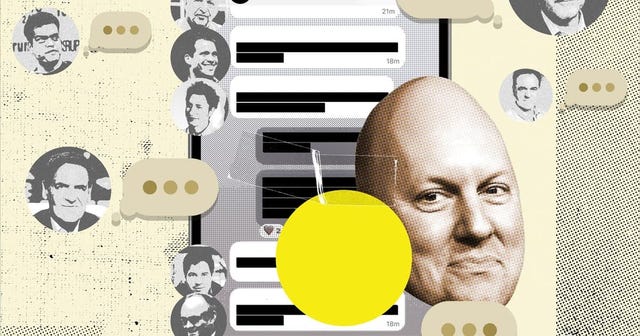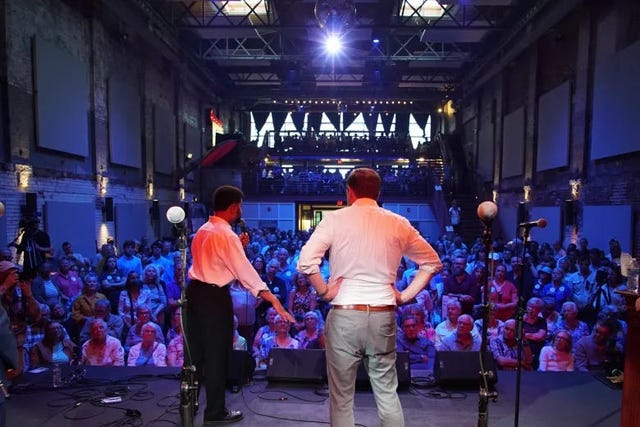Five Things: Nazis, Tech Elites, Bureaucracy, Democrats, Hitchhiking
It's Sunday. Read this now.
Hello and welcome back to Five Things!
We started into May with a left-wing demonstration taking place in front of our house, which was an interesting experience and we left the house before it began. Our whole neighborhood was filled with police in riot gear. The motto of the rally was “who has shall give” and apparently we live in such an upscale neighborhood that left-wing demonstrators think we are the richest among the richest. May Day in Hamburg is full of folklore, but usually they do burning barricades at the same spot every year and don’t take their protest into other parts of the city. Everything stayed calm this Labor Day, it was just a bit louder than usual on a holiday.
I do like Labor Day and as a student of the labor movement I think it is important to reflect on the achievements, but also discuss what still needs to be done to create a better future for everyone. I am sure that AI will change the workforce much more than we can understand now and this will turn into a serious discussion soon. The trade unions will need to reinvent themselves to cope with a workforce that works alongside AI with its superpowers or with smart robots that can lift and drill and whatnot.
✊🏻
Have a great Sunday!
Germany’s Intelligence Agency Labels Far-Right AfD as Extremist
Germany’s domestic intelligence service has classified the far-right Alternative for Germany, which some polls show as the most popular in the country, as an extremist party, the German authorities announced on Friday.
The decision intensifies a quandary for Germany about what to do about the party, known as the AfD, whose leaders have trivialized the Holocaust, revived Nazi slogans and denigrated foreigners, all the while expanding their political base.
Finally. Now cut their tax-payer based funding, don’t invite them into talkshows anymore and make sure they don’t get to chair any parliamentary commissions, then let our Constitutional Court decide that the party violates our constitution and therefore needs to be dissolved.
We need to defend our democracy and we have to fight back against this threat!
Sure, you can talk to Nazis. It just depends on the setting.
The group chats that changed America
This constellation of rolling elite political conversations revolve primarily around the venture capitalist Marc Andreessen and a circle of Silicon Valley figures. None of their participants was surprised to see Trump administration officials firing off secrets and emojis on the platform last month. I did not have the good fortune to be accidentally added to one of the chats, which can be set to make messages disappear after just 30 seconds.
But their influence flows through X, Substack, and podcasts, and constitutes a kind of dark matter of American politics and media. The group chats aren’t always primarily a political space, but they are the single most important place in which a stunning realignment toward Donald Trump was shaped and negotiated, and an alliance between Silicon Valley and the new right formed. The group chats are “the memetic upstream of mainstream opinion,” wrote one of their key organizers, Sriram Krishnan, a former partner in the venture capital firm Andreessen Horowitz (typically styled a16z) who is now the White House senior policy adviser for AI.
The influence of the tech elites on the Trump White House is scary.
Bonfire of the bureaucrats
Anti-bureaucratic sentiments are as old as bureaucracy. The rise of modern government bureaucracies in the late-19th century, characterised by permanent, salaried officials, whose loyalty was to their office and not to any political leader or party, has always been viewed as a mixed blessing at best. This ambivalence is captured in the words of the great theorist of bureaucracy Max Weber, who noted how it operates “without regard for persons”. By focusing on documentation, numbers and due process, bureaucracy can be both efficient and fair – but also dehumanising. If not held in check, bureaucracy turns procedure and record-keeping into a kind of fetish, that eventually blocks innovation and imagination.
We need to readjust the way bureaucracy works, so that people understand that it is a service provided for the people.
The Public Wants a Reckoning, Not Another Performance
The Democratic Party’s central mistake in this era has not been a lack of energy, nor a lack of moral clarity about the dangers posed by the far right. It has been a catastrophic misreading of what the public’s hunger for “fighting back” actually means.
Institutions continue to demand trust, obedience, and emotional loyalty, even as they fail to deliver the basic conditions of a decent life. The rituals of democracy — voting, messaging, performances of resistance — are maintained, but their connection to lived material security, civic belonging, and a believable future has frayed beyond recognition.
Same goes for the Social Democratic Party in Germany.
The Enduring Joy of American Hitchhiking
Contemporary hitchhikers stick out their thumbs for all sorts of reasons. Some might be able to travel in greater comfort but choose hitchhiking because they enjoy the adventure. Others can afford to see new cities or get where they need to only by catching a ride. The differences come when people encounter a problem. If a traveler is stuck in a place for days and has some money, they can get food and a room or a bus. If they don’t, they might end up flying a sign asking for cash.
We recently watched Kleine Haie with our oldest daughter, a movie from 1992 that starts with the main characters hitchhiking to Munich. My wife and I talked about how we used to hitchhike to and from school, back in the days. I regularly hitchhiked from my hometown to nearby Hamburg, but also to and from my collegetown, which is about 3 hours away from Hamburg. Of course, in German we say “trampen” - to tramp, which sounds more like Hobos jumping on freight cars. I never had a scary experience and it is quite weird that we hitchhiked when we had no smartphones, no GPS, nothing - and now that theoretically every move in a car with a stranger could be tracked, hitchhiking is not common at all anymore.
That’s it. Have a great Sunday! If you missed last Sunday’s edition of Five Things, have a look here:
— Nico









